
I have heard countless times from people who are getting marked off (whether it’s by a teacher or a grammar checker) for writing too passively, but they don’t know how to fix it. If this applies to you, then this guide is really going to help.
In this post, we’ll go through what passive voice is, how to recognize it, and ways to fix it to improve your writing. We’ll also talk about when to ignore that wavy line and just let the passive voice roll. After all, it isn’t always wrong to use it.
Let’s get started.
What Is Passive Voice?
Even if you really aren’t sure what passive voice is, you probably have an idea about what a passive person is like (or, worse, a passive-aggressive person). There is a reason that writing uses the same word: They are very similar.
What do you know about the word passive in general?
You may think of someone that just lets things go by them without reacting. Or perhaps you think about a person who never comes out and says what they really feel.
Sentences can do this too. In passive voice sentences, the main actor in the sentence doesn’t really do anything. It lets the action do all the work. It’s, well, passive.
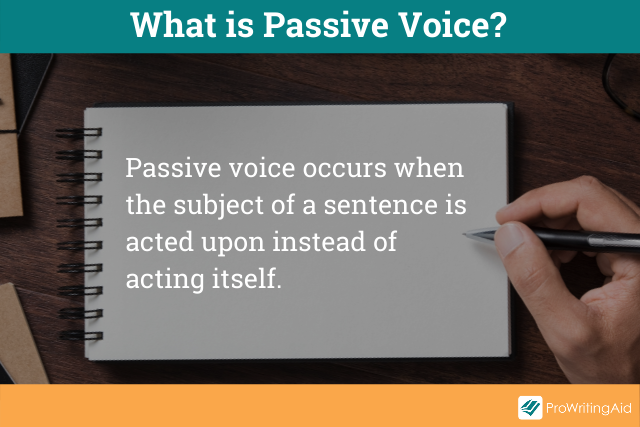
Let’s talk about this in technical terms:
- Passive voice occurs when the subject of a sentence is acted upon instead of acting itself.
We’ll cover more examples later, but just in case you need to see one to understand, let’s start with an easy one:
- The ball was kicked.
Notice that there is a ball at the center of the action in this sentence. It’s the subject of the sentence. It’s what the sentence is all about. However, it isn’t doing anything. It’s just sitting there waiting for someone or something else to kick it. In other words, it is being acted upon. It’s very passive.
That is what passive voice is. And just like a person who is always passive, sometimes you just want to tell that sentence to do something already!
Don’t just sit there letting the writing pass you by. Be more active. This is why many people will say that passive voice is a little boring. If you want your writing to be more lively, then your subjects need to be more lively too.
The Opposite of Passive Voice Is Active Voice
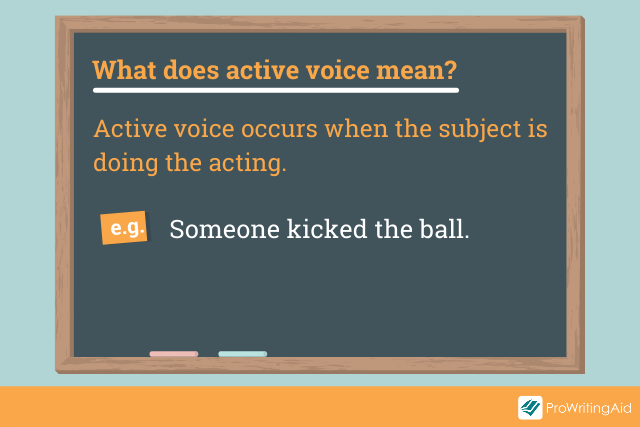
So what is the opposite of passive, then?
If passive voice occurs when the object or subject of the sentence is being acted on, then it makes sense to learn that active voice occurs when the subject is doing the acting.
Let’s look at the sentence from above:
- The ball was kicked.
OK. So one of two things can happen here. For starters, we can ask what the ball, the subject, did. Did it soar through the air? If so, then we can make this sentence active by saying that:
- The ball soared through the air.
Notice that suddenly the ball is doing something. It isn’t just sitting around waiting to be kicked.
Of course, sometimes the problem with the sentence isn’t just that the subject isn’t acting; it’s more that the wrong subject is there to begin with.
If kicked is really the verb you want to use in that sentence, then instead of trying to get the ball to kick something, which wouldn’t work unless you were writing sci-fi, you can instead pick a subject that isn’t the object of the verb.
In other words, make an appropriate subject active.
- Someone kicked the ball.
Now, someone is the subject of the sentence, and they have kicked the ball. Very active.
This is a good start, but I’ll have some more tips on fixing passive voice a little later. First, though, let’s talk more about how to spot passive voice in your writing.
How Can You Spot Passive Voice in Your Writing?
Once you know what passive voice is, it’s usually pretty easy to spot it. However, it’s also pretty reasonable to say you don’t want to go around every sentence asking what the subject is and how active it is being.
That’s why we have some easier and better ways to help you spot passive voice in your writing that take a lot less work.
Tip: The Passive Voice Zombie Test
The first tip I have is called the zombie test. This one is really helpful, and it works well.
If you want to check if a sentence is passive or not, just add the words “by zombies” after the verb. If the sentence makes sense, it is almost always because it is passive. If it doesn’t, that means it is likely active.
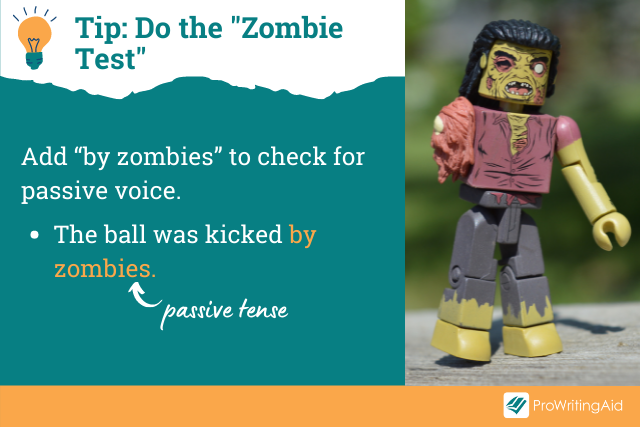
Here’s an example:
Let’s go back to that passive sentence from before:
- The ball was kicked.
You can go through all of the above steps.
What is the subject? The ball. Okay, what is the ball doing? Nothing. It is just sitting there being kicked. Okay. That’s passive.
It would be easier, though, to just do this:
- The ball was kicked by zombies.
Does that make sense? Yes. It’s passive.
Now let’s look at our active voice sentence to see the opposite.
- Someone kicked the ball.
Once again, you could do a lot of work here.
Who is the subject of the sentence? Someone. What is someone doing? Kicking the ball. Okay. It’s active.
Or you could do this:
- Someone kicked by zombies the ball.
This doesn’t make sense. It’s active.
Easy, right?
Caveats to the Zombie Test
Like most things in life, the zombie test isn’t 100% perfect. So let’s talk about some problems you might have with it.
Issue 1: It’s Scary.
Maybe the idea of thinking about zombies just terrifies you, and you’d rather write passively than deal with the nightmares of thinking about zombies all day. If that sounds like you, don’t worry. You don’t need to use zombies for this to work.
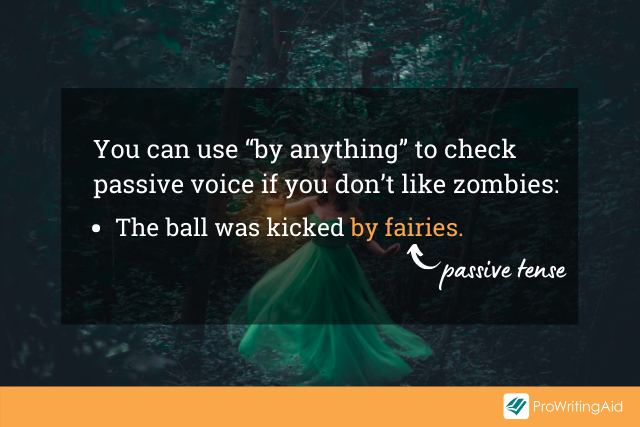
Zombies are standard in this test because they are the passive beasts of the monster world. However, there is no reason you couldn’t use “by unicorns,” “by Justin Bieber,” or even “by me” in your sentences. It all works exactly the same.
Issue 2: It’s Not Foolproof.
Let’s say you write the sentence, “She ran.” That is an active sentence (which you can tell because the subject, she, is doing the action, running.) Yet, “She ran by zombies” technically makes sense. So how does that affect the test?
Okay. You got me there, but there is an easy way around this: Does adding “by zombies” completely change the point of the sentence? In this case, the original sentence was all about her running. Now, suddenly it is about her passing zombies on the way. This is a lot different than just learning who kicked the ball, which is still the subject.
At any rate, this usually only happens in really short sentences that only have a noun and a verb. So maybe do some double-checking on these small sentences, but mostly feel free to trust the test on longer ones.
Does ProWritingAid Detect Passive Voice?
It’s really good to know the grammar rules and how to spot passive voice on your own (if only in case one day you have to hand-write something, your WiFi goes out, or you are taking an in-class test). However, let’s be real: There is another easy way to spot passive voice.
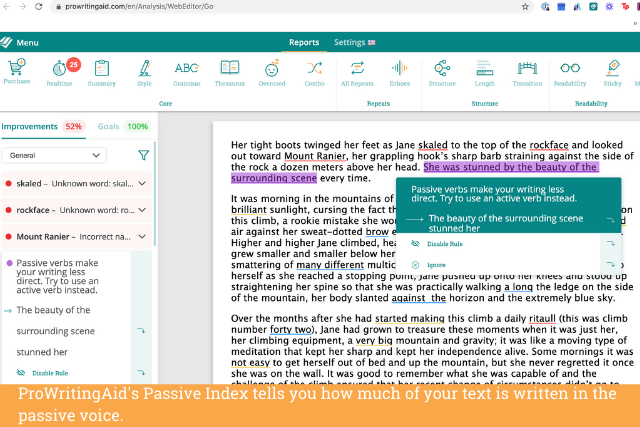
Just look out for the purple highlights in ProWritingAid. They mark the passive voice in your writing so that you can easily spot it without having to bring any zombies into your work. You'll even find ways to rephrase your sentence to the active voice with just a click. Easy!
Check your writing for passive voice with a free ProWritingAid account.
Active and Passive Voice Examples
Now that you are perfectly clear about what passive voice is and how to spot it, let’s look at some examples.
Passive Voice Examples
Let’s start with some examples of passive voice:
- Something strange was seen.
- People were scared.
- A meal was eaten.
- The battle was lost.
- The girl is found.
Notice how all of these have a subject that is being acted upon and also how each of these would still make sense if you added “by zombies” after the verb. (Plus, you can’t see this on your end, but I assure you that each of these is being marked by my ProWritingAid extension.)
Active Voice Examples to Compare
I know this is an article on passive voice, but I honestly think it is easier to learn passive voice when you also know how to recognize the active. So, let’s also look at some examples here:
- She ran from the eerie creatures.
- He heard something in the distance.
- We learned about a safe town.
- The sirens rang in the distance.
- The world was quiet that night.
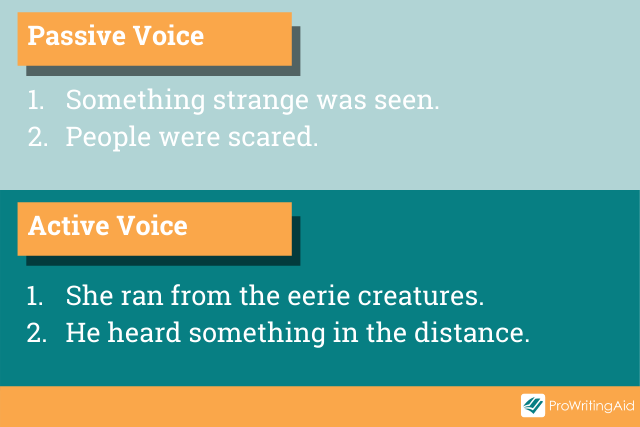
Notice once again that all of the subjects are doing something in these sentences (even the world is being quiet despite that tricky use of “was” that so many passive voice sentences use). Plus, if you add “by zombies” after the verbs, they don’t make sense.
Examples for You to Try on Your Own
Are you ready to test what you have learned? Let’s see which of these are passive and which are active. I’ll put the answers at the end of this post:
- The meal was prepared.
- He was bitten.
- She fought them off.
- They escaped.
- We were left behind.
How Do You Fix Passive Voice in Your Writing?
I have spent a lot of time talking about what passive voice is and how to spot it, which means there isn’t much room left to talk about how to fix it. Don’t worry, though. The reason I wrote it this way is because when you know how to spot it, fixing it becomes so easy it doesn’t need a lot of explanation!
I talked a little bit at the beginning about the two ways to fix passive voice, but I’m going to expand on those here.
Passive Voice Fixer 1: Making the Subject More Active
The first way to make a sentence more active is to figure out what the current subject of the sentence is doing and focus on that action.
Let’s fix a couple of the example sentences from above using this method.
Passive: The battle was lost.
In this case, what action might the battle be doing? Perhaps ending. Therefore, all we’d need to do to fix this is change the sentence to focus on the end:
Active: The battle ended when one side lost.
What about another example?
Passive: The girl is found.
In this one, what is the girl doing? It sounds like she was just waiting around, so let’s make that the verb.
Active: The girl waited there to be found.
Passive Voice Fixer 2: Changing the Subject to Something More Active
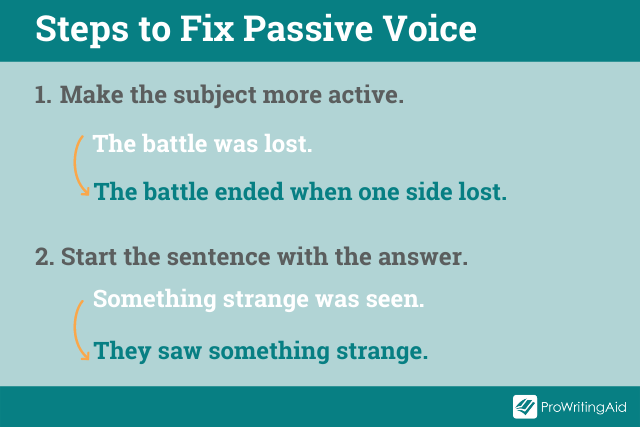
The next way to fix passive voice, and perhaps the easier way, is just to figure out who is doing the current action, and rewrite the sentence to focus on that actor.
Let’s use the rest of the above examples to test this method.
Passive: Something strange was seen.
Something strange was seen by whom? By them. Okay, let’s start with them, then.
Active: They saw something strange.
Passive: People were scared.
People were scared by what? By the strange sight.
Active: The strange sight scared them.
That just leaves one more example.
Passive: A meal was eaten.
A meal was eaten by whom? By you.
Active: You ate the meal.
See how easy this all is?!
Times Where Passive Voice Works
Even though you usually want people to be able to make decisions and actually do some work, sometimes it’s okay for people to just sit back and let others take control. In the same way, it is sometimes useful to let sentences be passive.
While you want to avoid doing this too much, I thought it was important to end this post with a few examples of situations in which passive voice may actually be your better option:
1. You don’t know who or what did the action. (e.g. The jewelry was stolen! But you don’t yet know by whom.)
2. The action itself matters more than the actor. (e.g. The robber was arrested. We all care more about the robber being arrested than who arrested them.)
3. The actor is really obvious and doesn’t need to be stated. (e.g. The robber was arrested. Sticking with this example, everyone knows the cops did the arresting, so there is no reason to say it.)
4. You want to be vague, evasive, or secretive. (e.g. Mistakes were made. By whom? I’m certainly not admitting it was by me! Companies do this a lot to admit a problem occurred without taking on liability.)
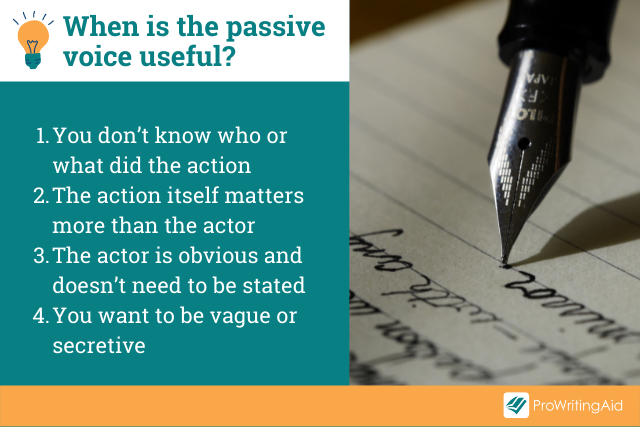
Finally, the moment you have been waiting for. The answers to the practice examples are as follows:
- Sentences 1, 2, and 5 are passive
- Sentences 3 and 4 are active
How did you do?
If you didn’t get them all right, that’s okay. After all, that is what ProWritingAid is for!


